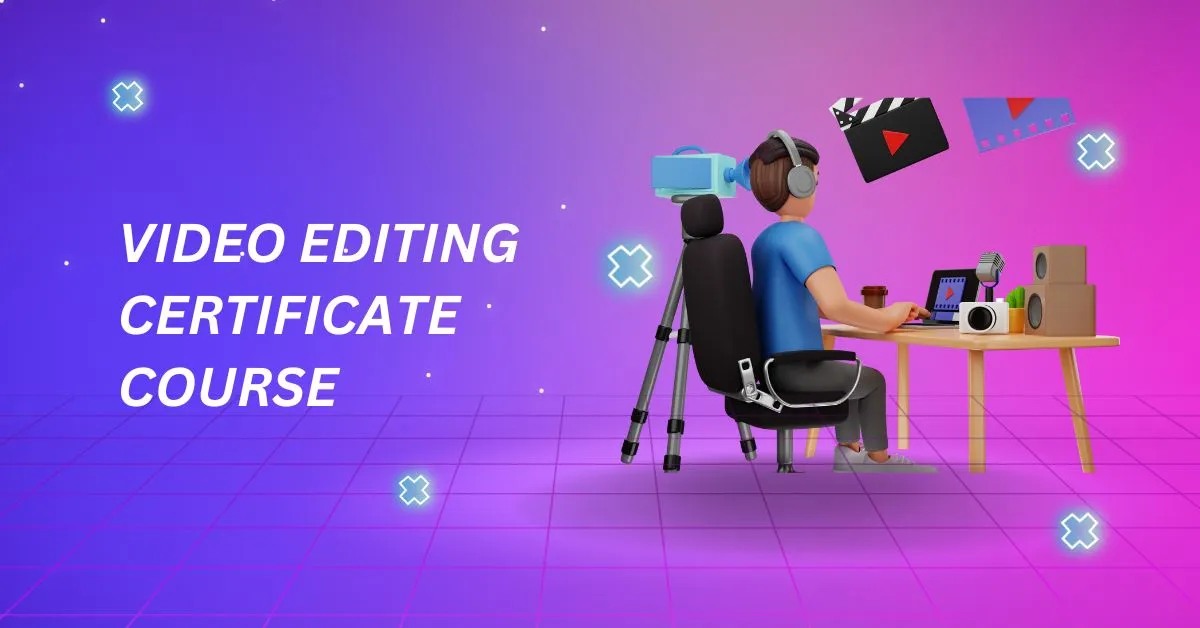


22, May 2023
Video editing is the process of manipulating and rearranging video footage, audio, and visual effects to create a cohesive and compelling video production. It involves selecting, trimming, and combining video clips, adjusting the sequence and timing, enhancing the visual and audio elements, and adding transitions, titles, and other effects to create a polished final product.
In today's digital age, video editing has become an indispensable skill in various industries. Whether you aspire to work in film, television, advertising, or social media, having a solid foundation in video editing Certificate course can open doors to exciting career opportunities. If you are considering pursuing a career in this field, obtaining a video editing certification can enhance your skills and boost your professional prospects. In this article, we will delve into the fees, course details, and eligibility criteria for a video editing certification course.
While the specific syllabus for a video editing certificate course may vary depending on the institution or training provider, here is a general outline of topics commonly covered in such courses:
Introduction to Video Editing:
Understanding the role of video editing in various industries
Introduction to video editing software and tools
Overview of different video file formats and resolutions
Familiarization with the user interface and essential features of editing software
Video Editing Fundamentals:
Importing, organizing, and managing media assets
Basic editing techniques: trimming, cutting, and rearranging clips
Working with the timeline and creating a narrative flow
Adding transitions, effects, and titles to enhance the visual appeal
Audio editing and synchronization with video footage
Advanced Video Editing Techniques:
Color correction and grading to enhance visual aesthetics
Applying visual effects and filters to create unique looks
Working with green screens and chroma keying for compositing
Motion graphics and animation to add dynamic elements
Multicamera editing and synchronization for multi-angle shots
Workflow and Project Management:
Creating efficient editing workflows and organizing project files
Collaborating with team members and managing revisions
Exporting and delivering final projects in various formats
Understanding different distribution platforms and requirements
Project backup and archiving best practices
Industry Best Practices:
Understanding storytelling principles and visual storytelling techniques
Analyzing and critiquing existing video content for inspiration
Keeping up with current trends and styles in video editing
Adhering to copyright laws and obtaining necessary licenses
Portfolio Development:
Applying learned skills to create original video projects
Receiving feedback and refining projects for a professional portfolio
Showcasing completed projects to potential employers or clients
Additionally, some video editing certificate courses may include supplementary topics like:
Specialized editing techniques for specific genres (e.g., documentary, narrative, music videos)
Working with advanced editing software and plugins
Introduction to sound design and audio editing techniques
Advanced color grading and correction techniques
Project-based assignments and real-world simulations
The fees for video editing courses can vary significantly based on several factors such as the institution or training provider, course duration, level of specialization, geographic location, and course delivery format (online or in-person). Here are some general guidelines regarding the fees you can expect:
Short-term or Online Courses:
Short-term or online video editing courses typically range from a few hundred dollars to a few thousand dollars. The fees for these courses tend to be more affordable compared to longer-term or in-person programs. The exact cost can depend on the quality of instruction, depth of the curriculum, and additional resources provided.
Comprehensive or Specialized Programs:
Comprehensive video editing certification programs or those that offer specialized training may have higher fees. These programs often provide in-depth instruction, hands-on experience, and access to advanced editing software and resources. The fees for such programs can range from a few thousand dollars to several thousand dollars.
In-person or Intensive Programs:
If you opt for an in-person video editing
course, particularly those offered by prestigious institutions or in major cities, the fees may
be higher due to factors such as facility costs, instructor expertise, and additional resources
provided. In-person programs can range from a few thousand dollars to several thousand dollars.
Financial Assistance and Scholarships:
Some institutions or training providers may offer financial assistance options such as scholarships or installment payment plans to help make the course more affordable. It's worth exploring these opportunities if they are available
Obtaining a video editing certification opens up various career options in the media and entertainment industry. Here are some potential career paths you can pursue:
Video Editor:
As a video editor, you can work in film, television, advertising, or online content creation. You'll be responsible for assembling and editing raw footage, enhancing visuals and audio, adding effects, and creating a cohesive final product.
Film or Television Editor:
Working specifically in the film or television industry, you can specialize in editing feature films, documentaries, TV shows, or web series. This role involves collaborating closely with directors, producers, and other creative professionals to bring their vision to life.
Motion Graphics Designer:
Combining video editing skills with graphic design, you can specialize in motion graphics. This role involves creating animated visuals, titles, and visual effects to enhance video content and create engaging motion graphics sequences.
Multimedia Specialist:
In this role, you can work on various multimedia projects, including video editing, audio editing, graphic design, and interactive media. You may create multimedia content for websites, presentations, training materials, or marketing campaigns.
Social Media Content Creator:
Many companies and brands rely on engaging video content for their social media channels. As a video editor, you can specialize in creating short-form videos, promotional content, and engaging visual material for social media platforms.
Freelancer or Independent Contractor:
With a video editing certification, you have the option to work as a freelancer or independent contractor. You can offer your services to clients on a project basis, providing video editing expertise for a range of projects across different industries.
Post-Production Supervisor:
In larger-scale productions, you may pursue a career as a post-production supervisor. This role involves overseeing the entire post-production process, managing a team of editors, coordinating with directors and producers, and ensuring timely delivery of the final product.
Content Creator and YouTuber:
With the rise of online platforms like YouTube, there are opportunities to become a content creator and YouTuber. You can edit and produce your own video content, build a following, and monetize your channel through ads, sponsorships, or brand partnerships.